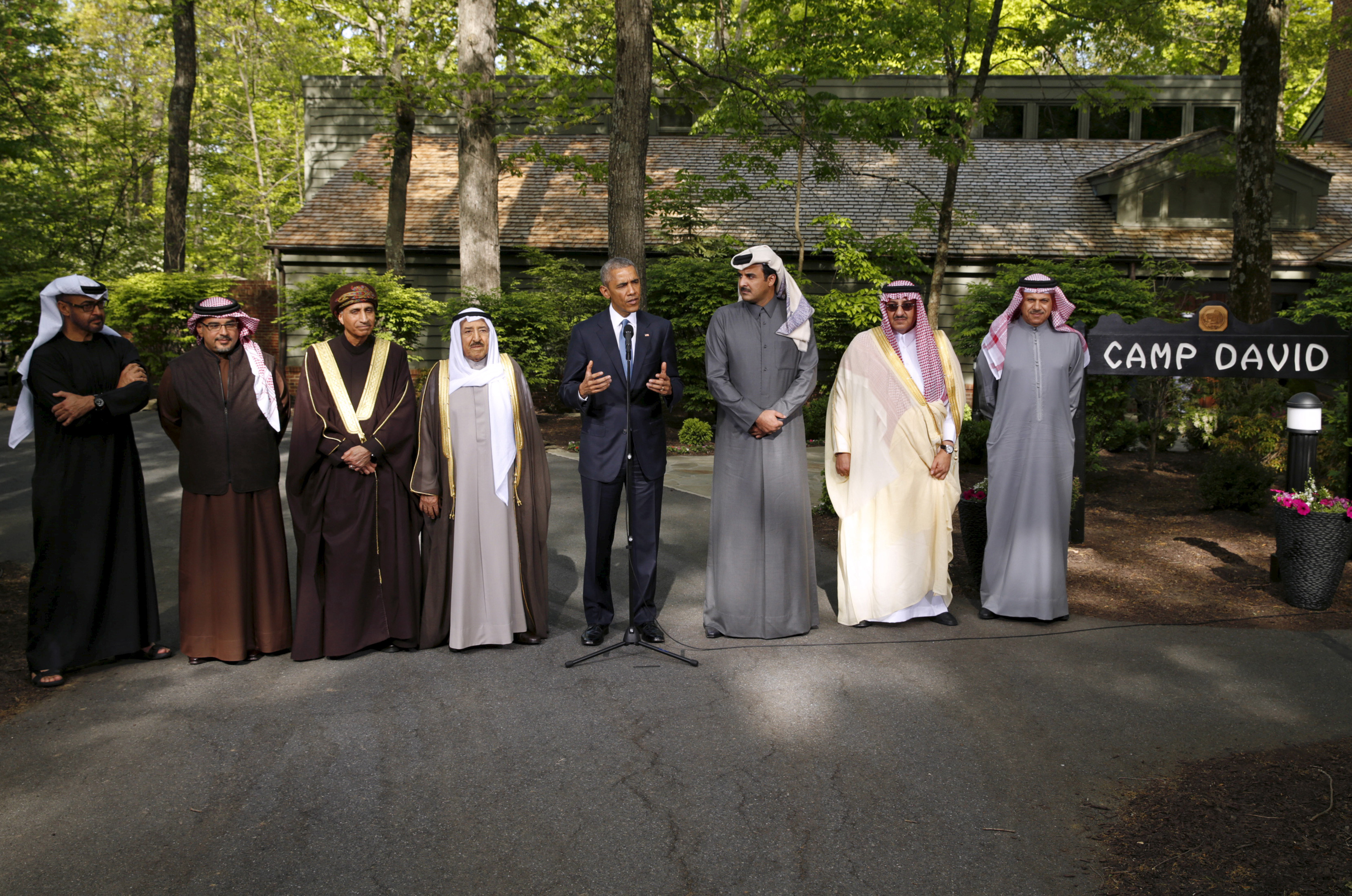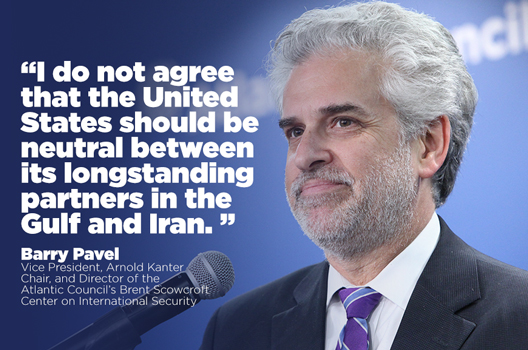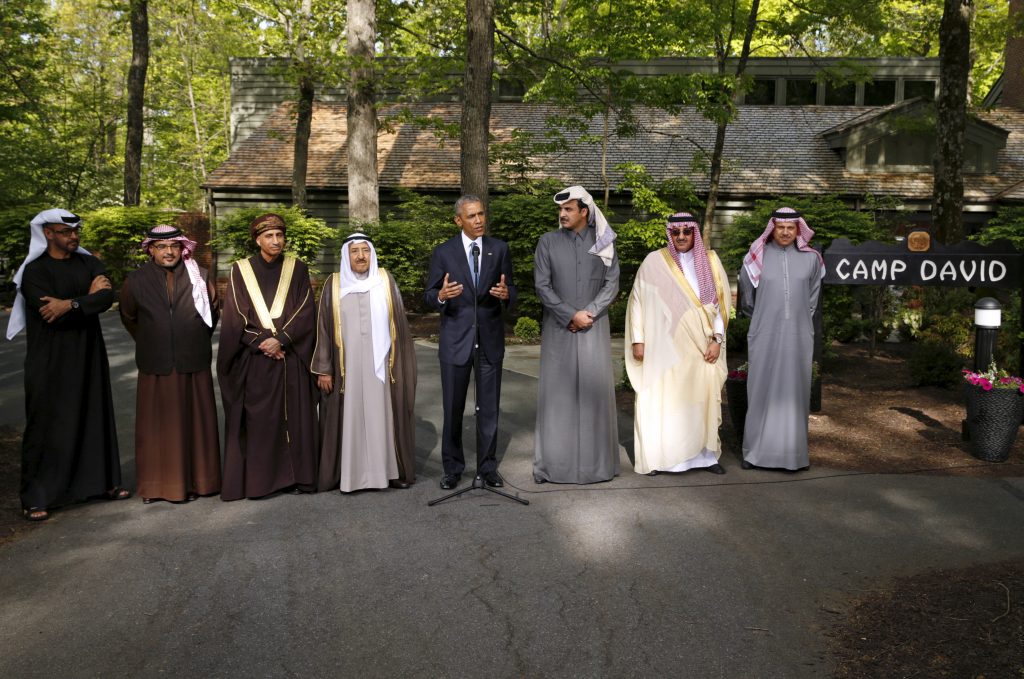
The United States must not be neutral in its relationships with its Gulf partners and Iran, says Atlantic Council’s Barry Pavel
As US President Barack Obama prepares to attend a summit with Gulf Cooperation Council leaders in Riyadh on April 21, the Atlantic Council’s Barry Pavel has some words of advice: The United States must not be neutral in its relationships with its Arab Gulf partners and Iran.
The Riyadh summit is part of an extended diplomatic effort to allay concerns in Arab Gulf countries about Iran’s regional ambitions and the perception of US disengagement from the region.
“I do not agree that the United States should be neutral between its longstanding partners in the Gulf and Iran,” said Pavel, Vice President, Arnold Kanter Chair, and Director of the Atlantic Council’s Brent Scowcroft Center on International Security. “Our partners are not undertaking an expansionist set of activities and trying to destabilize neighboring countries. Iran has this built into its constitution.”
Riyadh severed relations with Tehran in January after protesters stormed its embassy in Tehran following the execution of a prominent Shi’ite cleric in Saudi Arabia. In an interview with the Atlantic magazine, published in April, Obama said Arab Gulf states and Iran need to “share” the Middle East.
Pavel suggested that just as during the Cold War, when the United States engaged the Soviet Union while at the same time confronting its aggressive behavior, Washington should now look “very imaginatively and assiduously to bring Iran in from the cold to the greatest extent possible” while holding it accountable on issues such as its ballistic missile program. While the nuclear deal reached last summer between Iran and the P5+1 countries—the United States, the United Kingdom, China, France, Russia, and Germany—lifted some sanctions on Iran, other sanctions related to the Islamic Republic’s ballistic missile program and terrorist activities remain.
Arab Gulf states are particularly anxious because of the nuclear deal with Iran. In a bid to allay this anxiety, Obama hosted a Camp David summit for GCC leaders in May of 2015 at which he reaffirmed “our iron-clad commitment to the security of our Gulf partners.” The GCC includes Bahrain, Kuwait, Oman, Qatar, Saudi Arabia, and the United Arab Emirates.
The President, however, stopped short of offering what some Gulf states had hoped for: a formal defense treaty. Instead he announced measures that include integrating ballistic missile defense systems, stepping up cyber and maritime security, facilitating weapons sales, and increasing the frequency of joint military exercises.
Some tangible progress in terms of weapons sales has been made since Camp David and at the very minimum the summit “increased the velocity of communications at very high levels,” said Pavel. “That is very important, especially in a region like the Middle East.”
But there have been some bumps in the road as well. As Obama prepares to head to Riyadh, the US Congress is considering a bill that would allow the Saudi government to be held responsible in US courts for any role in the September 11, 2001, terrorist attacks on the United States. Saudi officials have threatened to sell off billions in US assets if the bill passes.
Obama himself provoked an angry reaction from the Arab Gulf states when he described to Jeffrey Goldberg of the Atlantic magazine some Gulf countries as “free riders” because of their overreliance on US military action.
“I personally don’t see any of the partners, or at least most of them, as free riders,” said Pavel. “They are contributing in different ways. Of course, we want them to contribute more.”
Barry Pavel spoke in an interview with the New Atlanticist’s Ashish Kumar Sen. Here are excerpts from our interview.
Q: President Obama said in a recent interview with the Atlantic that the Arab Gulf states need to “share” the Middle East with Iran. Do you agree?
Pavel: I agree with the concept that war would be a very dangerous and disastrous outcome for the region and for the world. But I do not agree that the United States should be neutral between its longstanding partners in the Gulf and Iran. Our partners are not undertaking an expansionist set of activities and trying to destabilize neighboring countries. Iran has this built into its constitution.
Like in the Cold War when we engaged the Soviet Union even as we were confronting their aggressive activities, I think the analogy holds and we should be looking very imaginatively and assiduously to bring Iran in from the cold to the greatest extent possible. Here I’m talking about cultural and humanitarian exchanges, diplomatic, economic, trade etc., but at the same time we need to hold them accountable for their dangerous activities. That includes their ballistic missile program, which is still subject to sanctions, and all of the other activities that are of concern to US interests and those of our regional partners.

Q: What tangible steps has the Obama administration taken since the Camp David summit to allay Arab Gulf countries’ concerns about the Iran nuclear deal?
Pavel: The May 2015 Camp David summit played a very helpful role. At minimum, it increased the velocity of communications at very high levels. Since the summit, the heads of state have been speaking more frequently. While not everyone is happy with everything, the relationships are on a better footing. That is very important, especially in a region like the Middle East.
There has also been some tangible progress on the commitments made at the summit. The working groups have met and are moving the ball in some cases. Some of the items, like additional and accelerated weapons procurement for the US’ Gulf allies, have come about. Progress has been made, but a lot more needs to be made, on all sides.
Another useful result of the announcement of the Riyadh summit on April 21 is that it will push the bureaucracies on all sides to accelerate their old efforts. We will also see new efforts, new lines of work that will be discussed and potentially also committed to at the Riyadh summit. Summits are very useful for governments because they force action that might not otherwise be proceeding at the necessary level of pace and quality.
Q: For the Arab Gulf states, is the United States today a less reliable partner?
Pavel: The most important thing is that this is the strong perception by many of our Gulf partners and by Israel. Regardless of what the administration says is its record of accomplishment in this area, the partners are not getting the memo. If your partner doesn’t think you are living up to your end of the partnership that’s an issue. Hopefully the Riyadh summit will play a role in diminishing those concerns.
Q: What are the roots of this perception? Have there actually been cutbacks in the US partnerships in the Gulf or is this more a PR problem for the Obama administration?
Pavel: There haven’t been cutbacks in military presence if you look at raw numbers (apart from the wars). What you are sensing is a relative lack of investment in relationships. I hear stories of meetings that are very transactional and where talking points are just read and partnerships are appearing, at least to the partners—both Israel and the Gulf, as less meaningful; that the United States is less invested. In particular, on the part of some in the Gulf, there is a strong feeling that they took great political risks to contribute to the US-led coalitions in Afghanistan and Libya and other operations that weren’t necessarily their top priorities. They feel that now that they are in active operations that are their top priorities, the United States should share their perception of those priorities and should support those operations with a much greater degree of urgency than they have seen. They feel somewhat betrayed.
Q: In the Atlantic interview, the President referred to some Gulf countries as “free riders” who push the United States into military action but are then unwilling to “put any skin in the game.” Is that fair assessment and what should Gulf countries be doing to address that perception?
Pavel: The United States has always been in the business of encouraging its allies to “share the burden” of our mutual security relationships. This is the decades-long history of the NATO alliance where the United States has been encouraging its allies to step up, spend more on defense, and contribute more military capabilities. I personally don’t see any of the partners, or at least most of them, as free riders. They are contributing in different ways. Of course, we want them to contribute more. I don’t think it is helpful to be casting aspersions in public, especially by the President of the United States while he is still in office. It might be unprecedented. I don’t think it is a helpful way to further deepen a relationship that should be based on mutual trust and commitment.
Q: Has the engagement with Iran and the declining US dependence on foreign oil diminished the importance of Arab Gulf partners to the United States?
Pavel: Analytically, I don’t think either of those things has reduced the importance of the region. A major disruption in oil flows would still affect the US economy. Like with our other partners and allies around the world, we have a mutual commitment to their security because it is in our interests to have that commitment and to have those military relationships. This is not an altruism, although some presidential candidates would suggest that it is. The United States’ security is greatly enhanced by working as far from US shores as possible with likeminded nations to prevent threats from getting worse, and, if necessary, to defeat them when they arise as far from US shores as possible. We would much rather play away games than home games. That’s what some candidates don’t get about alliances.
Q: The Islamic State of Iraq and al-Sham (ISIS) is expected to be high on the agenda in Riyadh. What should Saudi Arabia—and other Sunni countries—be doing in the effort against ISIS?
Pavel: They need to play a more robust role. They are very engaged in Yemen and very concerned about Iran, and to an extent both of those things mean they have to balance those demands with the effort against ISIS. But they should be just as worried about ISIS as the United States and Europe are. They can do much more with forces and cash and humanitarian assistance. On all of the efforts the coalition is doing in Iraq and Syria, they can be doing more. I think the United States should be doing more. [The Gulf states] will have a potentially more drastic set of scenarios that will confront them if this is not successful. They could really face a much more dramatic threat if this is not dealt with properly.
Q: On Syria, the ISIS attacks in Paris, Brussels, and San Bernardino and the spate of refugees in Europe has made fighting ISIS a priority for the United States rather than insisting that Syrian President Bashar al-Assad must go. For Arab Gulf states, particularly Saudi Arabia, the priority is that Assad must step down. Is there a compromise that can be reached on this point?
Pavel: Until you resolve the Syrian political system, which means a broader government that is reflective of the different cohorts in Syrian society, you are not going to eliminate the type of alienation and disenfranchisement that has greatly contributed to the growth and popularity of ISIS. There is no way on Earth that a dictator who has the blood of a quarter million of his people on his hands is going to be a legitimate leader of a country. No way! I believe that if the United States and others gain increased leverage, once that leverage is gained I have every hope that we will convince the Russians that the trajectory for Assad towards the exit door is the only way for this crisis to get resolved. Russia also has a very significant interest in it because this is going to spread to parts of Russia. Russia will have its own San Bernardinos. It is just a matter of time. We share a very strong common interest in resolving the root causes of this in Syrian society. I think a compromise can be reached.
Ashish Kumar Sen is a staff writer at the Atlantic Council. Follow him on Twitter @AshishSen.
Image: US President Barack Obama hosted leaders and officials from the six-nation Gulf Cooperation Council (GCC) at Camp David in Maryland May 14. From left are the United Arab Emirates' Crown Prince, Sheikh Mohammed bin Zayed al-Nahyan; Bahrain's Crown Prince, Salman bin Hamad Al-Khalifa; Oman's Deputy Prime Minister, Sayyid Fahd bin Mahmoud Al Said; the Emir of Kuwait Sheikh Sabah al-Ahmed al-Jaber al-Sabah; the Emir of Qatar Sheikh Tamim bin Hamad al Thani; Saudi Arabia's Crown Prince, Mohammed bin Nayef; and the Secretary General of the GCC, Abdul Latif bin Rashid Al Zayani. (Reuters/Kevin Lamarque)

